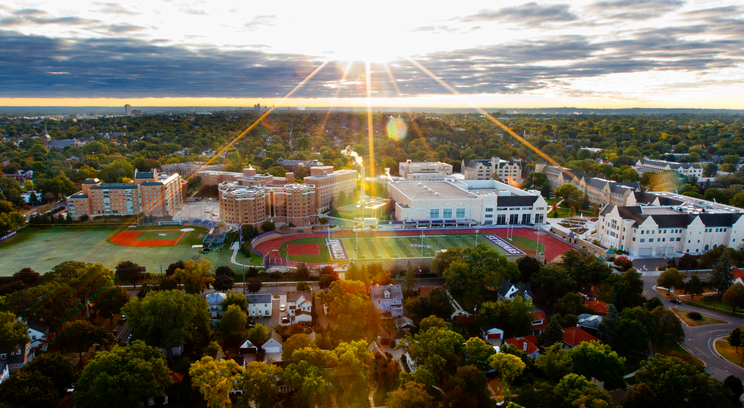More than eight of 10 St. Thomas faculty, staff and students who responded to the campus climate survey earlier this year expressed satisfaction with the university and the way it is operated.
The survey generated overall favorable responses between 58 and 84 percent in seven theme areas: Catholicism in today’s world; communication and community engagement; diversity effectiveness, commitment and accountability; diversity engagement; diversity-related experiences; equitable treatment; and satisfaction with the university.
The 5,429 respondents who completed or partially completed the survey gave higher marks to St. Thomas in all seven theme areas compared to the 2007 campus climate survey. Double-digit percentage favorable increases were uniform among faculty, staff and students in the equitable treatment and Catholicism in today’s world themes.
“Upon conclusion of the 2007 survey, I asked that the community work to make the university a more welcoming and inclusive place,” said Father Dennis Dease, president. “Clearly, all have taken that to heart. I am gratified by the improvement.”
“We have made significant progress since 2007, but we realize we still have areas to address,” said Dr. Susan Alexander, executive advisor to the president and the university’s affirmative action officer, and Dr. Michael Cogan, associate vice president for records and institutional effectiveness. “We have done some very good things over the last six years, but with any project like this we always need to look at ways to make St. Thomas more inclusive for everybody.”
Cogan credited the 36-person Climate Study Advisory Group (CSAG), which began meeting last September, with playing a key role. The group’s objectives were to provide a variety of perspectives and ideas in developing survey questions, encourage participation and develop research questions answered by data analysis when the survey was completed.
“I am impressed with the participation at all levels,” Cogan said. “Everybody pitched in here – from CSAG’s involvement on each and every issue to such a strong response rate from students, faculty and staff – and that made a big difference."
Survey results will be turned over to Dr. Julie Sullivan, who will become president on July 1, for further analysis and study on ways to continue to improve campus climate. (Links to survey results are at the bottom of this story.)
Survey conducted in March
Cogan’s office sent survey invitations to 13,619 St. Thomas community members in late February and followed up with four email reminders before closing the survey on March 22. Nearly 4,200 people (31 percent) completed the survey and more than 1,200 people responded to at least one question for a combined response rate of 40 percent.
In addition to quantitative results, nearly 1,050 people responded to the question, “Please provide any additional comments … that you would like to share as it relates to your experience at the university, campus culture, or the university’s diversity and inclusion initiative.” Those comments were grouped into five themes: affiliation, diversity, leadership, mission and finances.
Cogan defined several university “strengths” as determined by the quantitative survey:
- Five questions related to the “satisfaction with the university” theme generated an 84 percent overall favorable rating (75 percent in 2007), with students at 85 percent (78 percent), staff at 81 percent (70 percent) and faculty at 76 percent (61 percent). The range was 73 percent for full-time faculty to 88 percent for graduate students; male and female respondents were equally satisfied.
- The community had the most favorable perception of the four questions presented in the “diversity engagement” theme – 86 percent overall (compared with 80 percent in 2007), 86 percent of students (82 percent), 84 percent of faculty (78 percent) and 83 percent staff (78 percent)
- Graduate students were more favorable than undergraduate students on six of the seven themes.
Cogan also defined several “opportunities” coming out of the quantitative survey:
- Respondents who identified themselves as gay, lesbian, bisexual or transgender had a less favorable perception of campus climate than heterosexuals, and reported lower satisfaction scores on all seven themes.
- People of two or more races had a less favorable perception than those of one race in responding to 14 questions that were part of the diversity effectiveness, commitment and accountability theme.
- Full-time faculty generally had the least favorable perception of the university’s climate when compared to staff and students.
- Women had a less favorable perception of the eight questions related to the equitable treatment theme than men.
- Those who identified English as their native language were less favorable regarding all seven themes when compared to those who indicated English was not their native language.
In addition to Cogan and Alexander, CSAG members are: Jill Akervik, Young-Ok An, Bernard Armada, Kristine Baker, Maureen Bird, Sanjeev Bordoloi, Chad Brinsfield, Jane Canney, Nicholas Chang, Linda Dorn, Barb Dunker, Bridget Duoos, Terry Eggert, Kristi Flanagan Villar, Kari Fletcher, Marla Friederichs, Lori Friedman, Michael Glirbas, Mari Graham, Sara Gross Methner, Ann Johson, Lisa Keiser, Sushant Khullar, Aaron Macke, Father John Malone, Susan Myers, Mike Orth, Peter Parilla, Eleni Roulis, Julie Seykora, Victoria Svoboda, Becca Swiler, Mark Vangsgard and Amanda Wright.
Links to climate survey data
For more information, go to:
- The Office of Institutional effectiveness climate survey website.
- A summary of the survey findings (PDF).
- The abridged results (PDF).
- The extended results (PDF).







